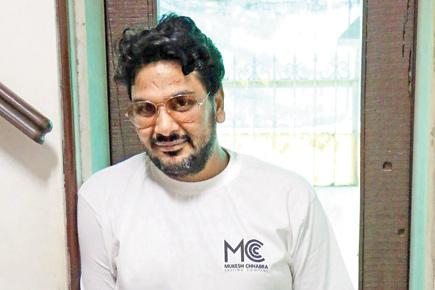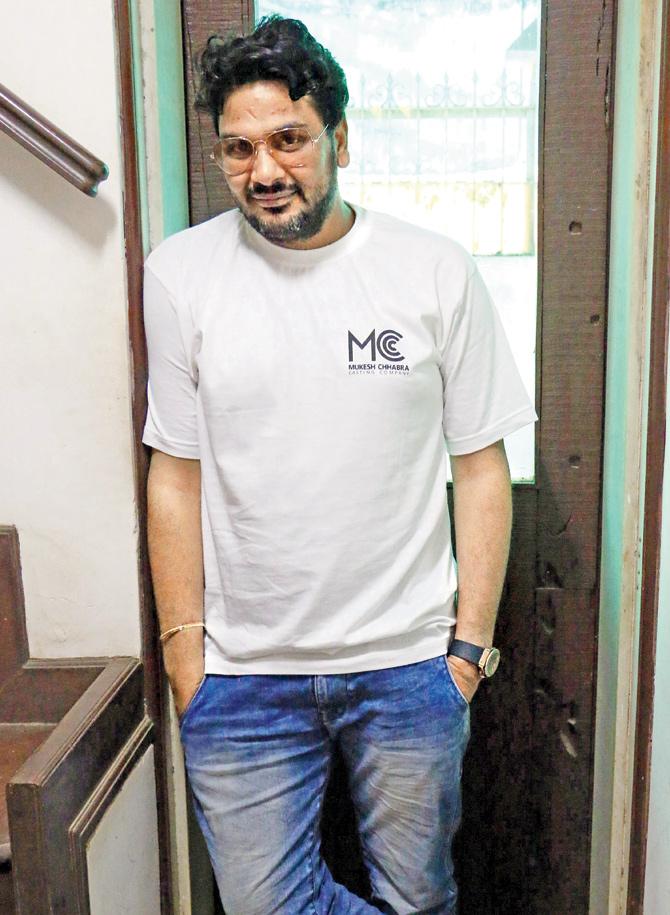He rather cast theatre actors says casting director Mukesh Chhabra, who held a theatre festival last week

Mukesh Chabbra
ADVERTISEMENT
When we search for Mukesh Chabbra’s bungalow in Aram Nagar, Versova, we are told that it’s the one with all the young people standing in a bunches outside, waiting to be auditioned. Chhabra’s own office is covered with film posters, as, perhaps, any casting director’s walls would be.
“Believability,” says Chhabra dressed casually in jean a tee, his typical Delhi diction endearing him to us right away, “is the most important thing I look for in an actor. I need to know that they can become the character. I am famous also for telling people that they can’t be actors, especially when they give up engineering or medical careers to pursue acting. I say ‘don’t do this’. I am known for my bitterness — I tell them not to waste their time. I’d rather give someone who has actually gone through the struggle, and done some theatre.”

Mukesh Chabbra at his Versova office. Pic/Swarali Purohit
It’s his love for theatre that was the push behind his firm Mukesh Chhabra Casting Co. organising the Khidkiyaan Theatre Festival last week. Produced by his father, TC Chhabra, the festival, that was attended by the likes of directors Imtiaz Ali and Anurag Kashyap, it featured four brand new plays.
“I wanted to give all the actors who don’t get a chance in Bollywood ya! I see so many people walk in every day and they teach me so much, especially patience. I also wanted to spread the culture of theatre. It’s not about just venues like Prithvi. Unlike Bhopal and Delhi, Mumbai lacks quality of shows. I am trying to do my bit.”
His interaction with theatre in Delhi introduced him to actors of different calibres, and he has never had a problem finding people to cast. “I knew good actors before I got to Bombay, and so it started off easy, as I just called them up.”
The 35-year-old from Delhi, who studied acting at the Shri Ram Centre for Performing Arts, had also done a six-year acting and teaching stint with the Theatre in Education Company that is affiliated with the National School of Drama. It was his father who introduced a young Mukesh to theatre. “Instead of movies, we went and saw plays,” says Mukesh.
After assisting in casting for Rang De Basanti (2006), he decided to move to Mumbai and take up casting full time. “It was a field where not many people were doing anything good. This space was empty. I wanted to bridge the gap between the director and the actor.”
His first big break was when he cast the unusually talented ensemble of Gangs of Wasseypur in 2013 and its sequel. He then went on to cast for Kai Po Che, Shahid, Ugly, Haider, Highway and Tamasha among others. Looking at his roster, you know he has an eye for picking the understated actor. The man who brought to the screen talent like Sushant Singh Rajput and Rajkummar Rao, says the Andheri myth of being “discovered” in a coffee shop is true. “I saw Sushant at Chai Coffee in Versova, and told him to come meet me. He had that something. Rajkummar I knew since my Delhi theatre days, and I knew he would fit into Wasseypur 2. And then I cast him in Shahid and Kai Po Che. Only one in 1,000 make it.”
It’s all about authenticity for Chhabra. “If I am casting a movie like Wasseypur, doesn’t it make sense to go to the north and get actors from there? I can’t cast a Bandra boy in that role.”
He feels that the way he casts and auditions is what sets him apart from the rest. It’s about being real and giving the actor the environment to act and react. “There will be two actors building up the scene. There’s a person behind the camera, and another giving background music. When I am auditioning, I am actually directing. It’s like shooting a film scene. In a way, I keep polishing my own directing skills, as I want to make a movie. This is the only practice I have,” he smiles. In fact, Sanjay Leela Bhansali has agreed to produce his directorial debut, which he is in the process of writing.
Chabbra also laughs in the face of rumours of the casting couch, that resurface every now and then. “It’s simple. When big directors are making movies, why will they resort to the casting couch? They are putting their money in the movie and they won’t just cast someone like that. Their reputation is on the line.”
It’s not an easy task being an actor, even harder, perhaps is to be the one who dashes their hopes or makes a career. A casting director today is the fine line between a struggling actor and stardom. “I see the anger in these people. Some have been coming here every day for five years. They keep me going,” he says. But, they also stress him out, he smiles. And that’s when he realises the lure of Bollywood. “They have very high hopes. In Bombay, your life can change overnight. This field attracts you like none other does — you like the fact that people like you. That keeps them going.”
Though he does say that he likes giving the serious actor a chance, he also says he knows within two minutes if you have it in you or not. But what is the “have” he needs. “Honesty. Am I believing what you are saying? Don’t impress me. Just be.”
 Subscribe today by clicking the link and stay updated with the latest news!" Click here!
Subscribe today by clicking the link and stay updated with the latest news!" Click here!








